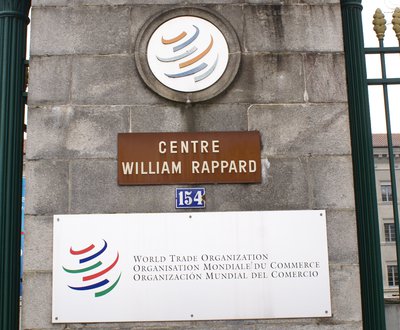2 Jul 2013
WTI Experts Offer Advice to the New WTO Director General
On 28 June, 2013, a hand-picked group of ambassadors, senior members of the WTO Secretariat, as well as leading private and public-sector stakeholders met at WTO headquarters in Geneva to ‘bluesky,’.i.e. generate ideas and advice, on some of the key challenges awaiting Ambassador Roberto Carvalho de Azevêdo and his new management team as they assume their new responsibilities at the multilateral trade body.
Two WTI faculty members, Pierre Sauvé and Arthur E. Appleton, were invited by The Evian Group at IMD, the Lausanne based business school which convened the meeting, to offer their views as guest speakers.
The day-long discussion was launched by Hamid Mamdouh, Director of the WTO’s Services Division. The session addressed how the WTO could improve or facilitate its negotiating (i.e. legislative) function. Given the rapid recent expansion of the Membership, the increasing diversity of Members’ collective preferences and levels of development, and the heightened complexity of policy issues Members need to confront, enhancing the efficiency of the WTO’s negotiating machinery represents one of the most central challenges facing the organisation.
Pierre Sauvé, the Director of External Programmes and Academic Partnerships and faculty member at the WTI, stated that “the new Director General and his team will need to find ways and words able to impart a new dynamic, a fresh start to negotiating dynamics that have held back forward movement for too long”. Sauvé focused his remarks on the recent rise of so-called “mega” PTAs and plurilateral negotiations in a new geo-political world. He asked whether the rising chorus of concerns directed towards such new negotiating configurations related to their sheer scale, which was arguably unprecedented, or to the identity of those members embracing such alternative fora and what it potentially suggested regarding the future of multilateral diplomacy. In his
WTI Board and Faculty Member Dr. Arthur E. Appleton directed his
The day’s discussions were concluded by a talk by outgoing WTO Deputy Director General Alejandro Jara, who offered his take on the likely outcome of the forthcoming Ministerial Conference (MC9) in Bali, Indonesia, and on the steps required to scale up preparatory work so as to ensure that MC9 imparts needed momentum both to the Doha Round and the multilateral trading system more broadly.
Further info
Mega_PTAs_and_Plurilaterals_PSAUVE_final.pdf
APPLETON_Comments_-_Blue_Sky.pdf


